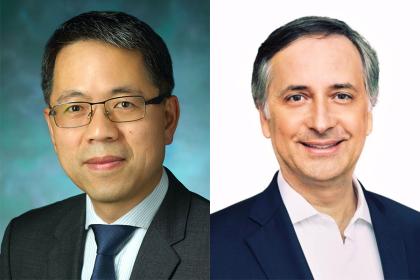Two Johns Hopkins researchers have been selected for membership in the National Academy of Inventors, the highest professional distinction awarded solely to inventors.

Image caption: Hai-Quan Mao and Victor Velculescu
Hai-Quan Mao, director of the Institute for NanoBioTechnology and a professor of materials science and engineering at the Whiting School of Engineering, and Victor Velculescu, professor of oncology and co-director of cancer genetics and epigenetics at the Sidney Kimmel Comprehensive Cancer Center at the School of Medicine are among 162 distinguished academic inventors to be named NAI fellows this year. The 2023 class of fellows represents 118 research universities, governmental and non-profit research institutions worldwide. Collectively, they hold more than 4,600 issued U.S. patents.
Mao is a pioneer in the development of nanomaterials for regenerative medicine and therapy delivery. In the regenerative engineering field, Mao creates nanofiber scaffolds to regenerate tissues such as the liver, soft tissues, and blood vessels. His interdisciplinary approach to research blends nanoengineered scaffolds with chemical signals to guide stem cells into becoming specific cell types, ultimately leading to innovative therapies targeting muscles, the spinal cord, and nerves. In the area of therapeutic engineering, Mao develops tiny nanoparticle packages that transport gene therapies to targeted cells in the body to fight cancer and other diseases. His scalable approach to manufacturing and assembling these genetic packages brings gene therapy and vaccines closer to reality.
Velculescu is internationally known for his discoveries in genomics and cancer research. He and his colleagues performed the first genome-wide sequence analysis in human cancers, identifying key genes and pathways dysregulated in tumorigenesis. This research has revealed the genomic landscape of human cancers, including in breast, colorectal, brain, pancreatic, ovarian, head and neck, and lung cancers. His lab currently focuses on identifying genetic alterations in cancer affecting sensitivity and resistance to targeted therapies, and connecting such changes to key clinical characteristics and novel therapeutic approaches.
"This year's class of NAI fellows showcases the caliber of researchers that are found within the innovation ecosystem. Each of these individuals are making significant contributions to both science and society through their work," said Paul R. Sanberg, president of the National Academy of Inventors, in a news release announcing this year's class. "This new class, in conjunction with our existing fellows, are creating innovations that are driving crucial advancements across a variety of disciplines and are stimulating the global and national economy in immeasurable ways as they move these technologies from lab to marketplace."
The 2023 class will be inducted at the 13th Annual Meeting of the National Academy of Inventors on June 18, 2024, in Raleigh, North Carolina.






